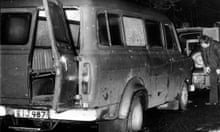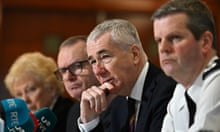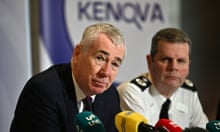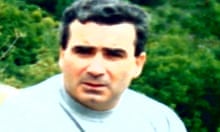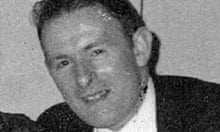All criminal prosecutions relating to the Troubles and future attempts to take civil actions would be blocked under UK government plans that have united Northern Ireland’s parties in opposition.
The proposals, which are also opposed by the Irish government, were announced by Brandon Lewis, the Northern Ireland secretary, who told MPs it was a “painful truth” that criminal investigations were unlikely to deliver successful outcomes.
Instead, the plan envisages the establishment of a new independent body, likened to South Africa’s truth and reconciliation commission and intended to help families find the truth about what happened to their loved ones.
The Information Recovery Body would have “full access” to information from state agencies and could take statements from individuals, according to a UK government document.
In a reference to republican and loyalist groups, it expresses the hope that “others” would also provide disclosures.
A third component will be an oral history initiative designed to let people from all backgrounds share experiences and perspectives relating to the Troubles. Legislation will be introduced by the end of the autumn.
TimelineKey events since the Troubles began
Show
Soldiers sent in to try to quell rioting in Derry which broke out after nationalists threw stones and bottles at a contentious Protestant Apprentice Boys parade two days earlier
British army fatally shoots 13 Catholic protesters during a civil rights march in Derry against internment
Edward Heath’s Conservative government closes the unionist-dominated Stormont parliament and imposes direct rule, which is to last for 26 years.
IRA expands campaign to mainland Britain, detonating bombs in two pubs in Guildford, killing five people, and continues to target other pubs popular with army personnel across the country
The Irish National Liberation Army kills the shadow Northern Ireland secretary, who is a close confidant of Margaret Thatcher, with a car bomb
After 66 days on hunger strike, during which he was elected to parliament, the IRA member Bobby Sands dies in detention in the Maze prison
An IRA bomb explodes at the Grand hotel during the Conservative party conference, killing five people and injuring 30, including the party chairman, Norman Tebbit.
After two years of intensive talks, the agreement is signed and is celebrated as the end of the Troubles. It establishes the Northern Ireland assembly, with David Trimble as its first minister
A car bomb planted by the Real IRA, a dissident splinter group, kills 29 people in Omagh, County Tyrone
The Democratic Unionist party and Sinn Féin agree to enter a historic power-sharing government, with Ian Paisley as first minister and Martin McGuinness as his deputy
The current system for dealing with the legacy of Northern Ireland’s conflict had been continuing to divide communities and it was time to do something “bold and different”, said Lewis.
Lewis said that current and future generations would be condemned to division, and reconciliation would be impeded if the government did not act.
“It is, in reality, a painful recognition of the very reality of where we are,” he told the Commons.
The proposals come with unprecedented plans to bring the shutters down on current and future inquests and civil actions, many of which relate to killings involving the army and police.
The UK government still wants people to come forward with information and believes that it would be a “disincentive” for people to do so if civil actions continued.
But the move, details of which had been leaked to the media in advance of being announced, has been rejected by all five political parties in Northern Ireland’s devolved government, and by victims’ groups and the Irish government.
Ireland’s minister for foreign affairs, Simon Coveney, also went on Irish radio to accuse the British government of reneging on commitments by both governments on “legacy” issues from the conflict and seeking to avoid applying the rule of law to atrocities.
He said he did not believe the proposals would be supported by the parties or people in Northern Ireland, adding: “There will be a strong onus on the UK government in the engagement process to explain how their proposals could fully comply with their European Convention on Human Rights and other legal and international human rights obligations.”
Many victims were having their worst fears realised in the proposals, claimed Amnesty International UK, which accused the British government of “closing down paths to justice”.
Jeffrey Donaldson, leader of the Democratic Unionist party, said: “Victims will see these proposals as perpetrator-focused rather than victim-focused and an insult to both the memory of those innocent victims who lost their lives during our Troubles and their families.”
Boris Johnson’s earlier description of the plans as a way for “a line to be drawn” under the events of the past were also condemned, with the Alliance party MP Stephen Farry saying that they “crossed a line”.
More than 3,500 people died during the conflict, which stretched from the early 1970s to the Good Friday agreement in 1998.
But while specialist police investigators have looked at unsolved murders, attempts to bring prosecutions have struggled and the UK government has come under pressure from Tory MPs and sections of the media which regard the inquiries as a “witch-hunt” against ageing service personnel.
Northern Ireland’s Public Prosecution Service this July announced its intention to withdraw proceedings against two former soldiers for murders in 1972.
That followed a review of the cases by the service in light of a court ruling that caused the collapse of another Troubles murder trial involving two military veterans.
On Wednesday, Lewis cited figures, from the Police Service of Northern Ireland, which he said proved that the focus on criminal investigations was not working.
The force was considering almost 1,200 cases, which represented a fraction of the 3,500 deaths and it would take more than 20 years to investigate using current resources, he said.
It is understood that the UK government believes that others will engage with the proposals once the “heat” around the announcement passes.
However, questions remain – ranging from what they would mean for future extradition requests to the UK government, through the legal standing of information given to the Information Recovery Body and in the oral history.
The shadow Northern Ireland secretary, Louise Haigh, accused the government of putting its own party political interests before the country in its plans for an “amnesty” on the Troubles.
